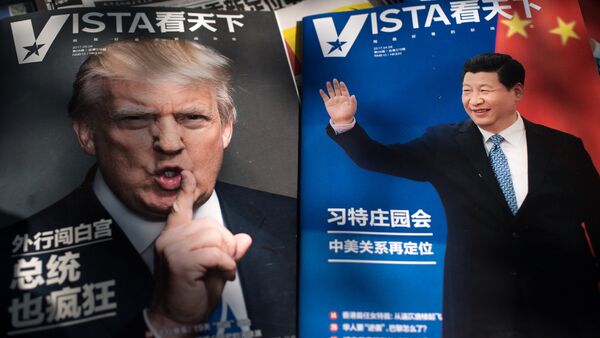On 15 January, the US and China signed a phase one deal of a broader trade agreement in Washington DC marking a breakthrough in a trade war simmering between the two major economies for nearly 18 months.
The 96-page document deals with the issues of intellectual property, technology transfer, trade in food and agriculture products, financial services, macroeconomic policies as well as currency to name just a few. On 13 January, the US Department of Treasury revoked its August 2019 designation of China as a "currency manipulator".
Three Reasons Why US Treasury's Move Was Right
According to Carl Fey, professor of international business at the Aalto University School of Business, Finland, the US Treasury's move was a step in the right direction for three reasons:
· First, the phase one deal contains provisions aimed at preventing China and the US from "manipulating their currencies to increase trade";
· Second, "there is evidence that China has recently been propping up its currency to prevent it from devaluing too quickly not weakening it and its potential efforts to weaken it to provide unfair advantage in foreign trade, which the US is concerned about";
· Third, although the yuan is still controlled by Beijing, the Chinese currency was given "some increasing freedom over the last decade", the academic says.
"It is, however, worthy to note that the move to add and remove China from the currency manipulator list at this time is likely at least partially political", Fey suggests, recalling that the last time the People's Republic was branded as "currency manipulator" was in 1994.
In the past Treasury branded three Asian countries as currency manipulators, namely, Japan in 1988, Taiwan in 1988 and then again in 1992, and China from 1992 until 1994, citing allegedly unfair currency practices. After the countries made adjustments to their foreign exchange regimes they were removed from the list.
According to the academic, the US decision to remove China from the list appears to be a gesture of good will demonstrated by Trump ahead of the signing of the breakthrough deal.
"A currency manipulator is a designation the US government gives to countries that engage in unfair currency practices which devalue their currency thus giving the country an unfair advantage in international trade due to cheaper prices of products and services", he explains.
Fey points out that the 1988 Omnibus Foreign Trade and Competitiveness Act requires the US to analyse the exchange rate policies of foreign countries annually.
The professor notes that "currency manipulation" was one of the crucial issues discussed during the talks aimed at ending the trade war between the US and China. The problem is that the companies originating from a country designated as a currency manipulator can be excluded from bidding for US government procurement contracts, he elaborates.
Trade War with China Was 'Bad Decision'
Commenting on the countries' decision to reach a broader trade agreement in a step-by-step manner, Fey opines that "it's is probably wise so that the markets can see some tangible progress sooner and multiple times".
"Each time a part of the trade agreement with China is signed it should positively affect the markets and help create new jobs as expectations for an easier time to export and thus more demand in many industries develops", he presumes.
According to the professor it was "a bad idea for the US to start the trade war with China". Fey draws attention to the fact that longstanding trade frictions have taken their toll not only on China but also on the US as well as the rest of the world. "I think there were better ways such as negotiations to achieve much of what the US wanted to achieve", he says.
As The Wall Street Journal outlined on 12 January, American farmers "took a big hit" while the country's economic growth in 2019 is trending near 2 percent, falling short of the White House's goal of 3 percent. Citing Oxford Economics and Moody’s Analytics, The Washington Post notes that the US-China trade war "shaved 0.3 percent off growth" – the equivalent of $65 billion – in 2019 and this figure is likely to grow to $85 billion in 2020, since the trade war is not over yet.




